Casper Steinfath - the boy from Klitmøller
To put it bluntly, his childhood in Klitmøller was wild. Perhaps some would describe it as limitless. Always in close contact with nature - and always with a healthy respect for its forces. He was enriched by his parents who didn't set limits but opened doors to new experiences and opportunities.
To fully understand Casper Steinfath's upbringing and development to the present day, where he has an impressive string of world and European championships in stand up paddleboard (SUP) and is one of the last 'survivors' in the TV2 series Korpset, we have to do a little time travel.
We are probably in the winter 1994. The place is La Grave in France. This is where the Steinfath family stayed during the winter months. Casper Steinfath is maybe half a year old, dressed in a light blue flight suit, round sunglasses and with a solid pacifier in his mouth. He is safely positioned in a baby harness on his father's chest as they glide down the slope on a snowboard at a leisurely, child-friendly pace. Not a sound passes his lips. He is safe and comfortable in his father's safe embrace. This is one of the scenes in Peter Alsted's documentary Standing on Water about Casper Steinfath's upbringing and career in the absolute world elite as a stand up paddler.
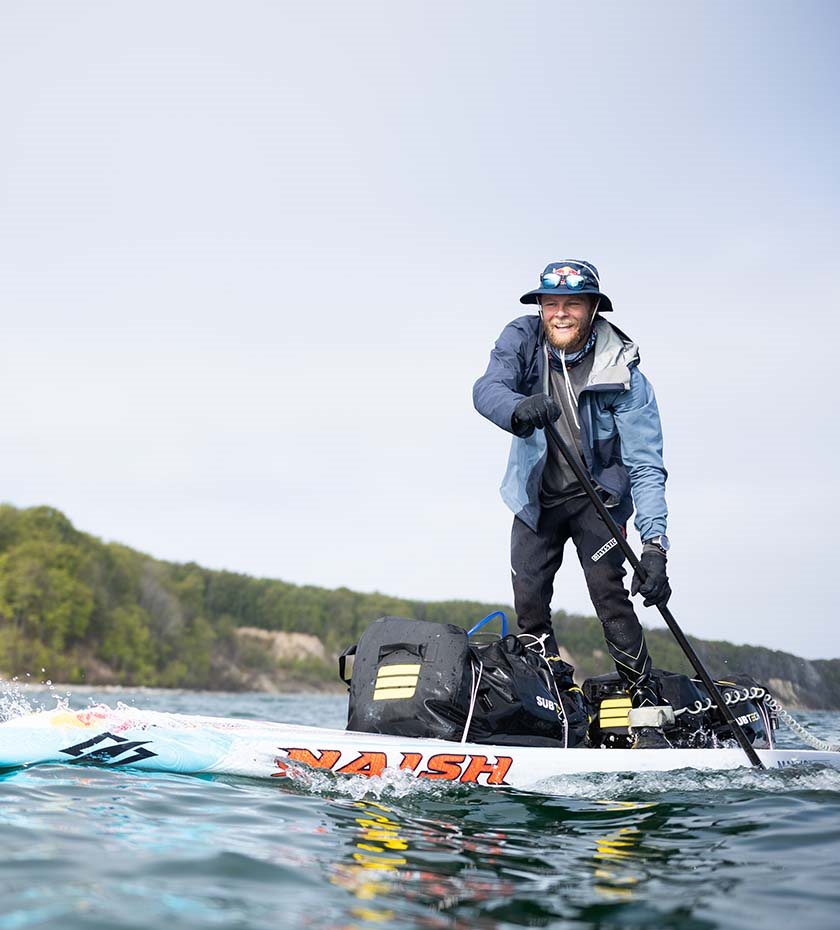
The scene on the slopes of La Grave in the French Alps is an early image of how Casper and his brother, Peter, grew up in a constant battle to challenge the elements of nature - and maybe even each other - and have new experiences that would give them new knowledge and insights about the limits that can be both terrifying and even fatal if crossed.
Let’s look at other clips in the movie. For example, where the two boys do somersaults in the open air from a sand dune several meters high. Or the same thing from the roof ridge of the family's house. They seem like boys always in competition to challenge and surpass each other. It's all about pushing the other into a bush and then hurrying away to avoid retaliation.
The dunes are located at Klitmøller. A small fishing village on the Danish west coast.
"My parents needed a place in Denmark where they could have a base. My father, Mike, is American, while my mother, Sus, is from Kolding. But it was here in Klitmøller that they saw new opportunities. My father lived and breathed the beach culture in California. It was a time of surfing and Beach Boys on the stereo. Up here in North Jutland in Klitmøller, they immediately saw opportunities for a more raw version of surfing. In a way, it's the story of my Californian surfer dad. But I grew up in it," says Casper Steinfath.
Klitmøller is a unique natural area where the wind from the North Sea rushes over dunes and lays down the mare straw. The family were some of the first to take to the waves at what would later be known as Cold Hawaii and attract surfers from all over the world.

It all started on a vacation in Madeira
That surfing and stand up paddling would become Casper Steinfath's destiny was in the cards. As he says himself, he could surf almost before he could walk. A story that goes quite well with the trip down the slope in La Grave when he was just six months old.
But it was a family vacation in Madeira that really got him hooked on the smooth surfboard and the thrill of riding a big wave heading inshore. "I want to go out and try the waves," he told his father. And so, it was out onto the massive waves off the tourist island in the Atlantic Ocean. His father said he wasn't entirely proud of the situation. They hadn't told his mother about the attempt to beat the waves. At first, Casper Steinfath seemed to simply disappear in them. People in the cars in the parking lots honked their horns. But it stopped abruptly when he suddenly came rushing over a huge wave in full control. He was maybe 14 years old.
From here on, he was hooked.
Since then, he has traveled the world with his four meter long surfboard. Winning championships and competitions in a row.
Stand up paddleboard competitions consist of a series of heats on M- or W-shaped courses, where you stand upright on your board and use your paddle to try to gain speed on the board. It's physically demanding and requires both preparation and strength.
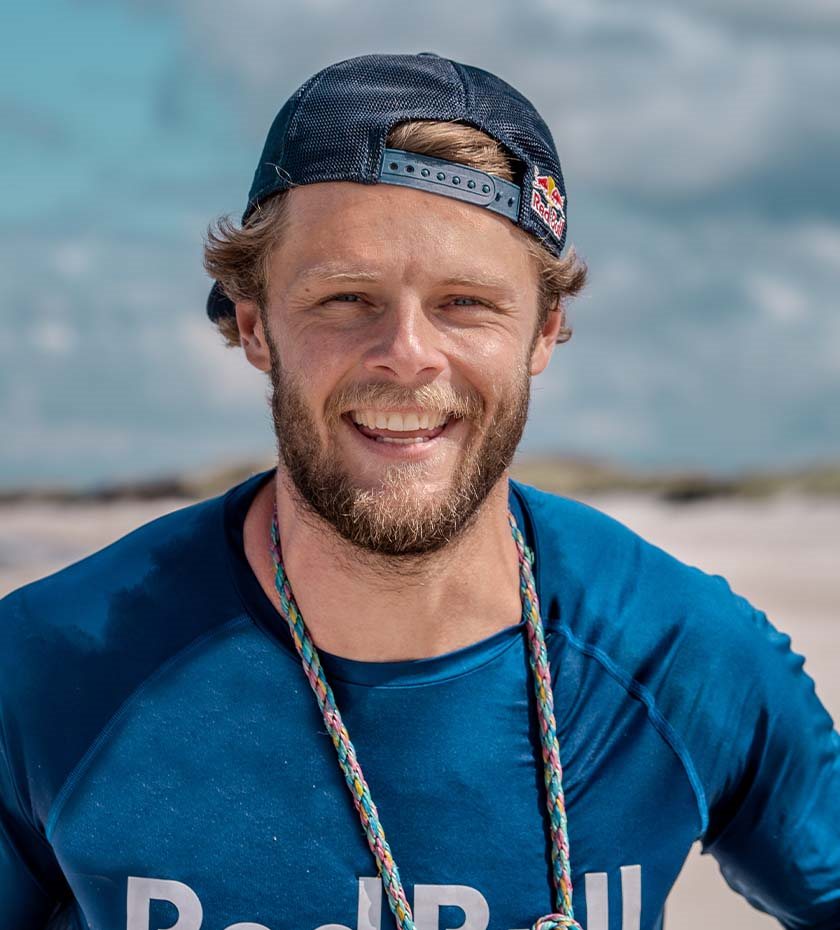
Skagerrak, Kattegat and the North Sea
"I'm not a conventional athlete. I have had - and to some extent still have - a great hunger for the competition itself. For me, it's also about stepping out of my comfort zone and trying something that won't necessarily succeed. But just the fact that I believe in it is enough. It requires me to work hard and be able to prepare myself optimally."
Ensuring optimal preparation - both mentally and physically - was put to the test in 2017 when Casper Steinfath became the first person to attempt to cross the Skagerrak. A distance of 137 kilometers from Klitmøller to Kristiansand in Norway.
He chose to complete the journey at night - and in winter. Simply because it made the challenge greater. But exhaustion, threatening storm warnings and a route that took him against the current meant he had to give up. Just 12 kilometers from the finish.
"It was overconfident. And I wasn't properly prepared. But nevertheless, it was a trip that also taught me a lot. Not least that it requires good preparation if you want to succeed. But just as importantly, it's the kind of experience that makes you appreciate what you have at home more. From my beloved soft sofa to hot food - and yes, everything we have together in our community."
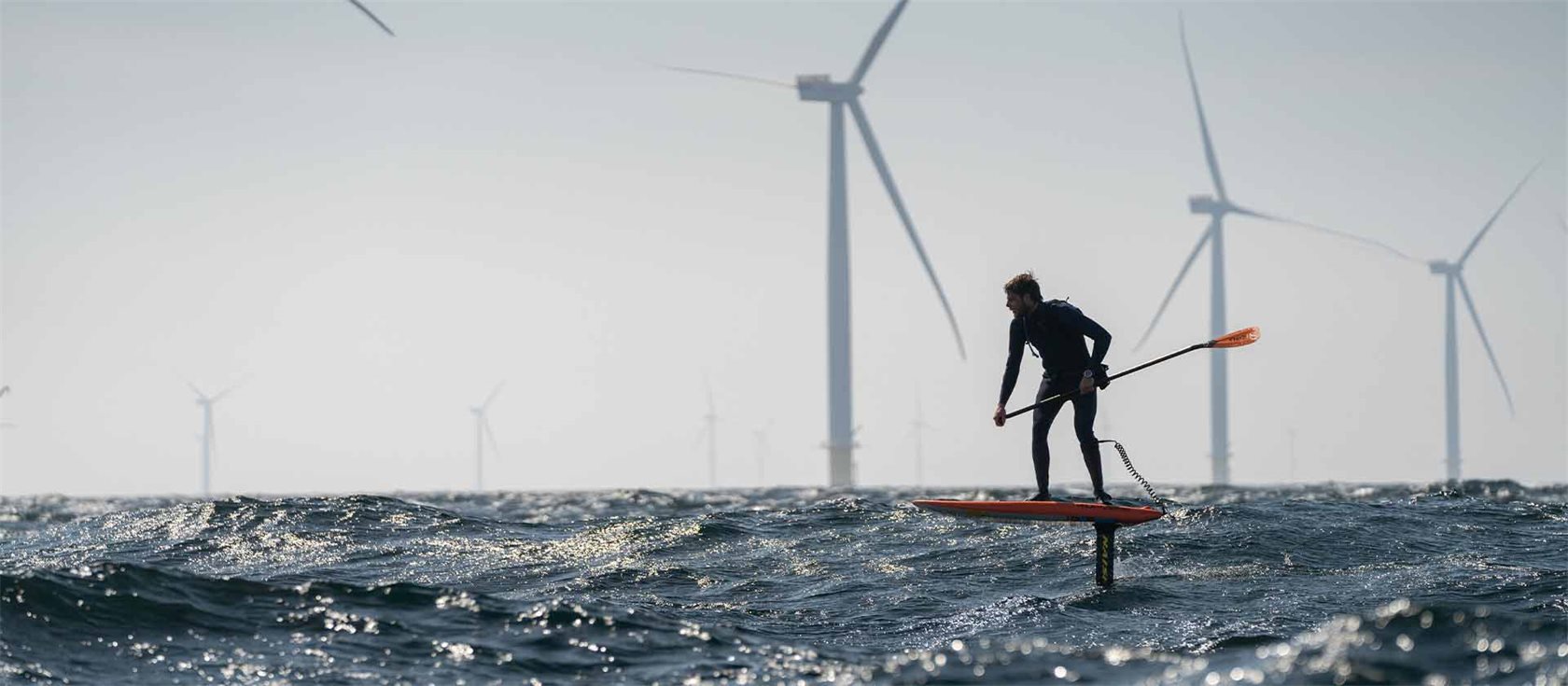
The following year, he managed to complete the trip. This time from Kjul Strand near Hirtshals. The trip was dubbed Viking Crossing 2. It took him 18 hours and 26 minutes before he was able to crawl ashore on the waterfront in Kristiansand. Quite a media event with a live TV broadcast from the support boat. Globally, more than 5.7 million TV viewers watched Casper Steinfath's battle against the elements. Over 600,000 followed his triumph on Facebook.
The epic trials were depicted in two documentaries and were followed by a trip across the Kattegat and a 1,400 kilometer trip around Denmark. Now the trip across the North Sea to England awaits. One of the three 'mountains' he wants to climb before he hangs up his paddleboard.
"But it's a very big challenge. On the trip to Norway I paddled at a speed of about eight kilometers per hour. Depending on the route, there are between 500 and 800 kilometers to cross in the North Sea. So, we're talking about at least 100 hours on a board in the middle of one of the most challenging sea areas in the world. It's not very deep. The water level is low and there's a lot of wind. It's simply a difficult piece of water."
Although it's a project that requires optimal preparation, support boats and a great amount of daring, it's also shows that Casper Steinfath's focus is slowly changing.
"Maybe it's the sense of adventure that's taking over. I used to have a fierce hunger to compete. I still do.
But I've become more selective. More picky about which competitions I choose to participate in. But challenging myself on projects like the Skagerrak and maybe the North Sea next year is becoming more and more important."
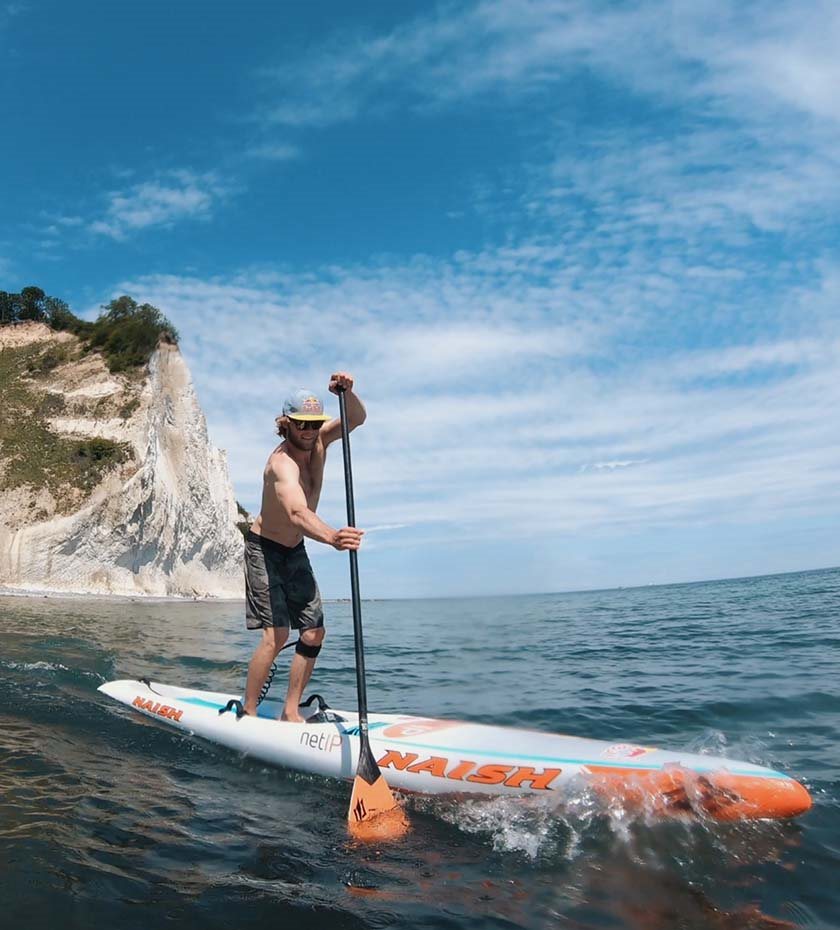
The fact that he is now focusing a little less on competition is not least because he had a little boy last year.
"Since I was very young, I've traveled eight or nine months a year. It was a bit of a rarity that my suitcases were left at home in Klitmøller. And even though my wife and I - just like my parents did - also travel with the whole family, I perhaps prioritize better and more precisely today."
Conversely, it can seem like a bit of a gamble to invest in epic projects such as the Viking expedition across the North Sea. It's not without risk.
"But I think my wife is okay with it. At least she doesn't tell me otherwise. Maybe it's also a bit about me coming home as a better version of myself - both as a father and husband - when I've been out. Whether it's at SUP competitions, adventurous projects, or like when I participated in the TV2 series Korpset."
The risk is something Casper Steinfath is very aware of. First and foremost because, in his own words, it 'keeps him sharp'. But also because it gives him the drive he needs to build up a meticulous knowledge and understanding of the 'water' he needs to conquer. He has spent hours talking to local fishermen about life on the North Sea. He has consulted experts to plan the best route. And before the second attempt to cross the Skagerrak, he got up at three in the morning to get his body and mind used to paddling at night.
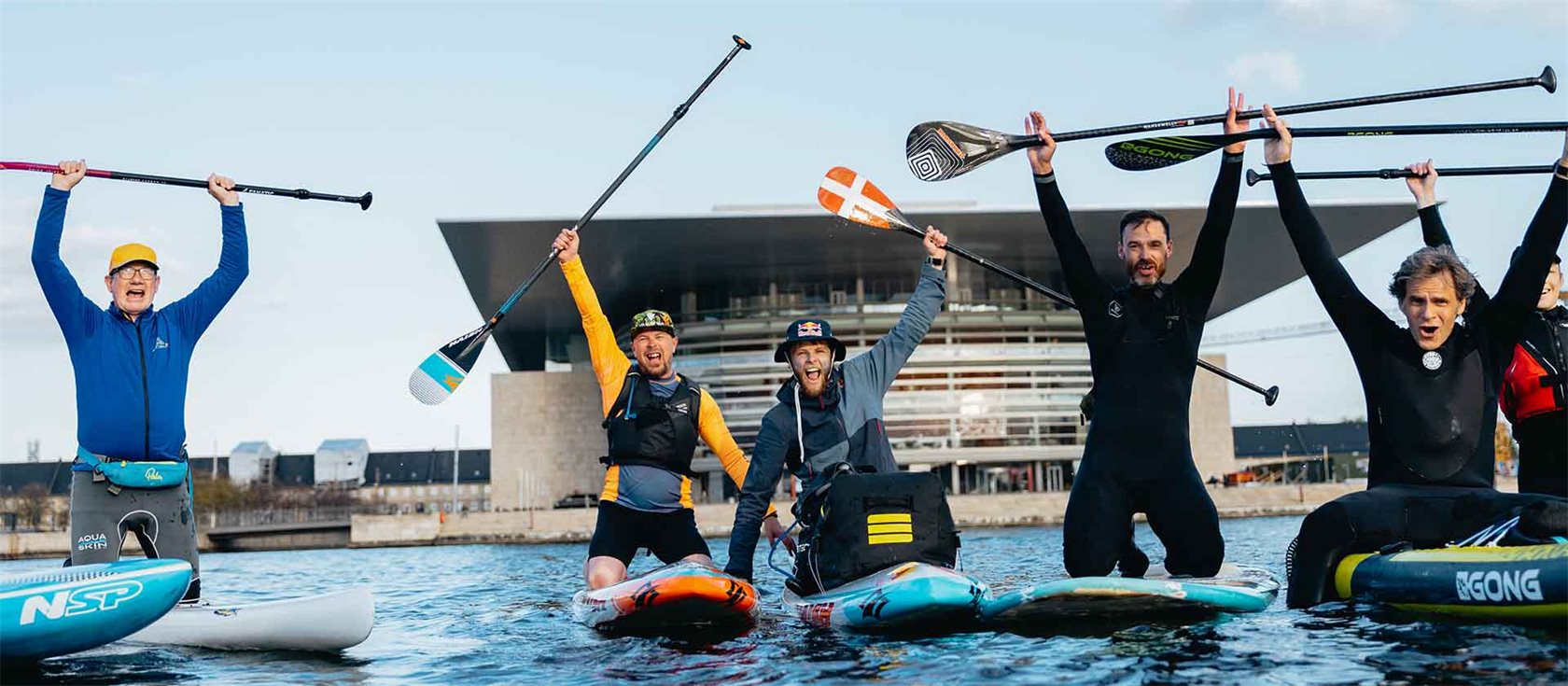
"But like Danish astronaut Andreas Mogensen, I've trained my whole life to get ready to complete my projects. For most of us, being in space for six months is a bit scary. There are so many things that can go wrong. But for Andreas Mogensen, it has become routine and he knows what to do in certain situations. That's how I feel too. When I know what risks I'm up against, I can make the right decisions."
Casper Steinfath says that his adventures sometimes has unfortunate consequences. "Like when people on the beach spot me out at sea on my paddleboard and call the emergency number. And suddenly there's a rescue helicopter hanging over my head."
He has experienced this more than once. Like when he, his brother and a friend decided in the middle of the storm called Bodil in 2013 that it 'must be the perfect weather for surfing'. People on the beach were horrified by the three young people surfing in the storm. This triggered a flurry of activity on social media, where the three young people were shamed. Even the Danish newspaper Ekstra Bladet mobilized its outrage over their recklessness. Without considering that they might have had the situation under control.
"Sometimes it feels a bit like that Nietzsche quote: And those who were seen dancing were thought to be insane by those who could not hear the music," says Casper Steinfath.
But life brings changes. Not least family life with an eight-month-old baby.
"In the past - and certainly as a teenager - it was a bit of an ego trip. It was all about being the best. Winning competitions. Today, I'm more focused on the team. It’s maybe a bit paradoxical for a man like me. But it really gives me a lot to be able to help others become better at what they want to do," he concludes.